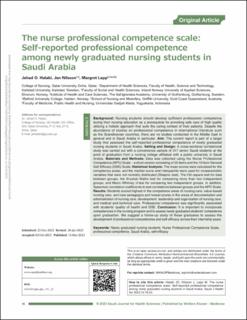| dc.contributor.author | Halabi, Jehad o. | |
| dc.contributor.author | Nilsson, Jan | |
| dc.contributor.author | Lepp, Margret | |
| dc.date.accessioned | 2024-02-09T07:32:59Z | |
| dc.date.available | 2024-02-09T07:32:59Z | |
| dc.date.created | 2023-08-21T09:36:17Z | |
| dc.date.issued | 2023 | |
| dc.identifier.citation | Saudi Journal for Health Sciences. 2023, 12 (1), 16-23. | en_US |
| dc.identifier.issn | 2278-1900 | |
| dc.identifier.uri | https://hdl.handle.net/11250/3116485 | |
| dc.description.abstract | Background: Nursing students should develop sufficient professional competence during their nursing education as a prerequisite for providing safe care of high quality utilizing a holistic approach that suits the caring context of their patients. Despite the abundance of studies on professional competence in international literature such as the Scandinavian countries, there are no studies conducted in the Middle East in general and in Saudi Arabia in particular. Aim: The current report is part of a larger study that assessed the self-reported professional competence of newly graduated nursing students in Saudi Arabia. Setting and Design: A cross-sectional correlational study was carried out with a convenience sample of 317 senior Saudi students at the point of graduation from a nursing college affiliated with a public university in Saudi Arabia. Materials and Methods: Data was collected using the Nurse Professional Competence (NPC) Scale – a short version consisting of 35 items and the 10-item General Self-Efficacy (GSE) Scale. Statistical Analysis: The mean scores were calculated for the competency areas, and the median score and interquartile were used for nonparametric variables that were not normally distributed (Shapiro–test). The Chi-square test for data between groups, the Kruskal–Wallis test for comparing more than two independent groups, and Mann–Whitney U-test for comparing two independent groups. In addition, Spearman correlation coefficients to test correlations between groups and the NPC Scale. Results: Students scored highest in the competence areas of nursing care, value-based nursing care, and care pedagogics and lowest scores in the areas of documentation and administration of nursing care, development, leadership and organization of nursing care, and medical and technical care. Professional competence was significantly associated with students' quality of health and GSE. Conclusion: It is important to incorporate competencies in the nursing program and to assess newly graduated students' competence upon graduation. We suggest a follow-up study of these graduates to assess the development of professional competencies and self-efficacy across their internship years. | |
| dc.language.iso | eng | en_US |
| dc.rights | Navngivelse-Ikkekommersiell-DelPåSammeVilkår 4.0 Internasjonal | * |
| dc.rights.uri | http://creativecommons.org/licenses/by-nc-sa/4.0/deed.no | * |
| dc.title | The nurse professional competence scale: Self‑reported professional competence among newly graduated nursing students in Saudi Arabia | en_US |
| dc.title.alternative | The nurse professional competence scale: Self‑reported professional competence among newly graduated nursing students in Saudi Arabia | en_US |
| dc.type | Peer reviewed | en_US |
| dc.type | Journal article | en_US |
| dc.description.version | publishedVersion | |
| dc.source.pagenumber | 16-23 | en_US |
| dc.source.volume | 12 | en_US |
| dc.source.journal | Saudi Journal for Health Sciences | en_US |
| dc.source.issue | 1 | en_US |
| dc.identifier.doi | 10.4103/sjhs.sjhs_151_22 | |
| dc.identifier.cristin | 2168323 | |
| cristin.ispublished | true | |
| cristin.fulltext | original | |
| cristin.qualitycode | 1 | |

